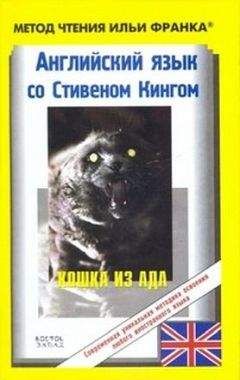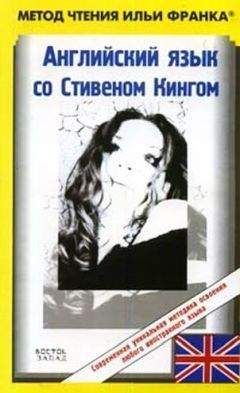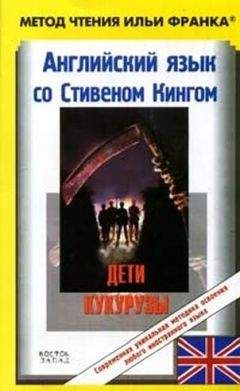Stephen King - Английский язык с Стивеном Кингом "Кадиллак» Долана"
guard [gRd], buzz [bAz], attempted [q'temptId]
The security guard answered when one of them buzzed at the gate, and unlocked it. The five of them talked and laughed together. The security guard attempted to goose one of the women and she slapped his hand aside, still laughing.
One of the women went back to the van and drove it into the turnaround. The others walked up, talking among themselves as the guard closed the gate and locked it again.
Sweat was pouring down my face (пот катился по моему лицу; to pour — литься/оводе, свете/); it felt like grease (он был какой-то жирный: «он ощущался, как жир»; grease — топленоесало, жир; to feel). My heart was triphammering (мое сердце стучало как отбойный молоток; hammer — /кузнечный/ молот; trip-hammer — падающиймолот).
They were out of my field of vision in the rear-view mirror (они были вне поля зрения моего зеркала заднего вида). I took a chance and looked around (я рискнул и обернулся).
I saw the back doors of the van swing open (я увидел, как задние дверцы фургона распахнулись; to swing — качать, размахивать).
One of them carried a neat stack of sheets (одна из них несла аккуратную стопку простыней); another had towels (у другой были полотенца); another had a pair of vacuum cleaners (еще у одной были два пылесоса; vacuum — вакуум, безвоздушноепространство; пылесос; cleaner — уборщик; очиститель/аппарат, приспособление/).
They trooped up to the door and the guard let them inside (они направились к двери /дома/, и охранник впустил их; troop — отряд, группалюдей; to troop — собиратьсяилидвигатьсягруппой).
I drove away (я уехал), shaking so badly I could hardly steer the car (меня так сильно трясло, /что/ я едва мог управлять машиной; badly — скверно, дурно; крайне, оченьсильно).
They were opening the house (они открывали дом). He was coming (он приезжал = он собирался приехать).
grease [grJs], stack [stxk], vacuum ['vxkjHm]
Sweat was pouring down my face; it felt like grease. My heart was triphammering.
They were out of my field of vision in the rear-view mirror. 1 took a chance and looked around.
I saw the back doors of the van swing open.
One of them carried a neat stack of sheets; another had towels; another had a pair of vacuum cleaners.
They trooped up to the door and the guard let them inside.
I drove away, shaking so badly I could hardly steer the car.
They were opening the house. He was coming.
Dolan did not trade in his Cadillac every year (Долан не менял свои «Кадиллаки» каждый год; trade — торговля; to trade in — отдавать старую вещь /автомобиль/ в счет покупки новой), or even every two (или даже каждые два) — the gray Sedan DeVille he was driving (серому седану «ДеВилль», на котором он ездил) as that June neared its end (в то время, когда тот июнь был на исходе) was three years old (было /уже/ три года). I knew its dimensions exactly (я точно знал размеры машины: «я знал его размеры точно»). I had written the GM company for them (я спрашивал о них в письме к компании Дженерал Моторс; towrite; GM= General Motors — «Дженерал Моторс» /крупнейшая в мире американская и транснациональная автомобилестроительная и моторостроительная компания/), pretending to be a research writer (прикинувшись писателем-исследователем; research— научное исследование; изучение). They had sent me an operator's manual and spec sheet for that year's model (они прислали мне руководство по эксплуатации и спецификации модели того года). They even returned the stamped, selfaddressed envelope I had enclosed (они даже вернули /пустой/ конверт с марками и обратным адресом, который я вложил /в свое письмо/; to enclose— окружать, огораживать, окаймлять; вкладывать /в конверт/). Big companies apparently maintain their courtesy even when they're running in the red (крупные компании несомненно соблюдают этикет, даже когда они терпят убытки; courtesy— учтивость, обходительность; этикет; torun— бежать; работать, функционировать; inthered— «в красном», с убытком /выражение, используемое для обозначения убыточных операций, т. к. раньше в бухгалтерских книгах убытки записывались красными чернилами/).
I had then taken three figures (я захватил/взял три цифры) — the Cadillac's width at its widest point (наибольшую ширину: «ширину «Кадиллака» в самом широком его месте»; point— точка, пятнышко; место, позиция), height at its tallest (наибольшую его высоту: «высоту в самом высоком»), and length at its longest (и наибольшую его длину: «и длину в самом длинном») — to a friend of mine who teaches mathematics at Las Vegas High School (к моему другу, который преподает математику в средней школе Лас-Вегаса). I have told you (я /уже/ говорил вам), I think (я думаю), that I had prepared for this (что я был готов к этому), and not all my preparation was physical (и не все мои приготовления были физического /плана/). Most assuredly not (большинство — точно нет).
width [wIdT], height [haIt], mathematics ["mxTq'mxtIks], physical ['fIzIk(q)l]
Dolan did not trade in his Cadillac every year, or even every two — the gray Sedan DeVille he was driving as that June neared its end was three years old. I knew its dimensions exactly. I had written the GM company for them, pretending to be a research writer. They had sent me an operator's manual and spec sheet for that year's model. They even returned the stamped, selfaddressed envelope I had enclosed. Big companies apparently maintain their courtesy even when they're running in the red.
I had then taken three figures — the Cadillac's width at its widest point, height at its tallest, and length at its longest — to a friend of mine who teaches mathematics at Las Vegas High School. I have told you, I think, that I had prepared for this, and not all my preparation was physical. Most assuredly not.
I presented my problem as a purely hypothetical one (я представил свою проблему как чисто гипотетическую; topresent— преподносить, дарить, представить, показать). I was trying to write a science fiction story, I said (я пытаюсь написать научно-фантастический рассказ, сказал я), and I wanted to have my figures exactly right (и мне хочется, чтобы мои цифры были совершенно точными). I even made up a few plausible plot fragments (я даже сделал несколько правдоподобных фрагментов сюжета) — my own inventiveness rather astonished me (моя собственная изобретательность довольно-таки изумила меня; rather— скорее, точнее; довольно, в некоторой степени).
My friend wanted to know how fast this alien scout vehicle of mine would be going (мой друг поинтересовался: «хотел узнать», с какой скоростью: «как быстро» это мое внеземное разведывательное транспортное средство будет двигаться; alien— чужестранец; внеземной, инопланетный). It was a question I had not expected (этого вопроса я не ожидал), and I asked him if it mattered (и я спросил его, важно ли это; matter— вещество, материя; tomatter— иметь значение; значить; быть важным).
'Of course it matters (конечно, это важно),' he said. 'It matters a lot (это имеет большое значение). If you want the scout vehicle in your story to fall directly into your trap (если ты хочешь, чтобы разведывательная машина в твоем рассказе упала прямо в твою ловушку), the trap has to be exactly the right size (ловушка должна быть точно необходимого размера). Now this figure you've given me is seventeen feet by five feet (итак, цифры, что ты дал мне: семнадцать футов на пять футов; togive; feetмн.ч. от foot— ступня; фут /единица длины; = 30,48 см/).'
science ['saIqns], plausible ['plLzIbl], alien ['eIlIqn], vehicle ['vJIkl]
I presented my problem as a purely hypothetical one. I was trying to write a science fiction story, I said, and I wanted to have my figures exactly right. I even made up a few plausible plot fragments — my own inventiveness rather astonished me.
My friend wanted to know how fast this alien scout vehicle of mine would be going. It was a question I had not expected, and I asked him if it mattered.
'Of course it matters,' he said. 'It matters a lot. If you want the scout vehicle in your story to fall directly into your trap, the trap has to be exactly the right size. Now this figure you've given me is seventeen feet by five feet.'
I opened my mouth to say that wasn't exactly right (я открыл /было/ рот, чтобы сказать, что это не совсем так), but he was already holding up his hand (но он уже поднял руку, /останавливая меня/; to hold up — выставлять, показывать; поднимать).



